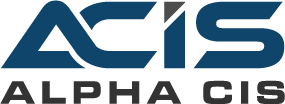Picture this: You’re sitting in your Buckhead office at 9 PM, staring at a stack of compliance documents that might as well be written in ancient Greek. Your healthcare practice just landed a major contract, but the client wants proof of HIPAA compliance. Your manufacturing company is eyeing a government contract, but CMMC requirements seem impossible to navigate. Sound familiar?
If you’re a Metro Atlanta business owner, you’re not alone in feeling overwhelmed by IT compliance requirements. I’ve watched countless local businesses, from Marietta medical practices to Alpharetta tech startups, either miss growth opportunities or spend sleepless nights worrying about compliance violations. But here’s the truth: compliance doesn’t have to be your growth killer. With the right approach, it can actually become your competitive advantage.
Key Takeaways
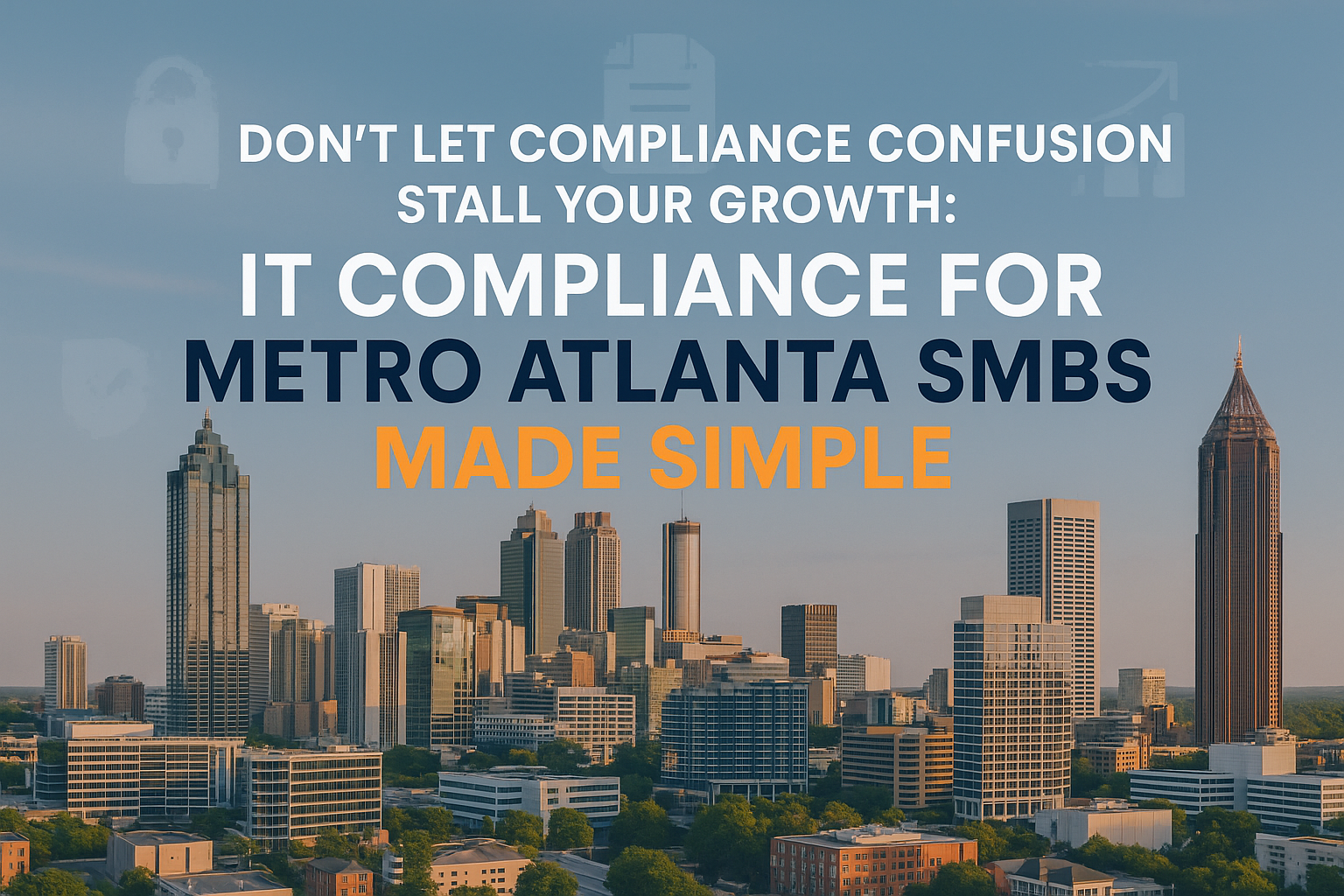
Ready to Take IT Off Your Plate?
Stop worrying about downtime, security risks, or endless IT frustrations. AlphaCIS is the trusted IT partner for small and mid-sized businesses in Metro Atlanta, keeping systems secure, connected, and running the way they should every day.
Whether it’s preventing costly outages, protecting your data, or giving your team unlimited support, we make sure technology helps your business grow instead of holding it back.
📅 Book Your Free Consultation- Compliance is a growth enabler, not a roadblock – Proper IT compliance opens doors to bigger contracts, builds customer trust, and protects your business from costly breaches
- Start with the basics – Focus on fundamental security measures like employee training, data encryption, and access controls before diving into complex frameworks
- Local resources matter – Metro Atlanta has specific compliance requirements and resources that can help streamline your journey
- Documentation is your best friend – Proper record-keeping and policy documentation can save you thousands in audit costs and potential fines
- Professional guidance pays for itself – Investing in compliance expertise upfront costs far less than dealing with violations, breaches, or missed opportunities later
Why Metro Atlanta Businesses Can’t Afford to Ignore IT Compliance
Last month, I spoke with Sarah, who owns a growing physical therapy practice in Roswell. She told me about losing a $200,000 contract with a major hospital system because she couldn’t demonstrate proper HIPAA compliance. “I thought having antivirus software was enough,” she said. “I had no idea about all the documentation and policies required.”
Sarah’s story isn’t unique. In Metro Atlanta’s competitive business landscape, compliance has become the price of admission for serious growth opportunities. Whether you’re in healthcare, finance, manufacturing, or technology, your ability to demonstrate proper IT compliance directly impacts your bottom line.
The Real Cost of Compliance Confusion
Here’s what I see happening to Metro Atlanta SMBs every day:
Lost Revenue Opportunities
– Government contracts requiring CMMC certification
– Healthcare partnerships demanding HIPAA compliance
– Financial services clients needing SOC 2 reports
– Enterprise customers requiring vendor security assessments
Increased Risk Exposure
– Data breaches cost an average of $4.45 million in 2025
– Regulatory fines that can reach millions of dollars
– Lawsuits from customers whose data was compromised
– Reputation damage that takes years to recover from
Operational Inefficiencies
– Employees are unsure about proper data handling
– Inconsistent security practices across departments
– Time wasted on manual compliance tasks
– Stress and burnout from compliance uncertainty
Understanding the Compliance Landscape: What Metro Atlanta SMBs Need to Know
Before we dive into specific frameworks, let’s clear up some common misconceptions. Compliance isn’t just about avoiding fines; it’s about building a foundation for sustainable growth and customer trust.
The Big Four: Compliance Frameworks Every Metro Atlanta Business Should Understand
1. HIPAA (Health Insurance Portability and Accountability Act)
Who Needs It: Any business that handles protected health information (PHI)
– Medical practices and hospitals
– Dental offices and veterinary clinics
– Health insurance companies
– Medical billing services
– Cloud providers serving healthcare clients
What It Covers:
– Physical safeguards for medical records
– Administrative policies and procedures
– Technical safeguards for electronic PHI
– Employee training and access controls
Metro Atlanta Reality Check: With major healthcare systems like Emory, Piedmont, and Children’s Healthcare of Atlanta dominating our region, HIPAA compliance is non-negotiable for many local businesses.
2. CMMC (Cybersecurity Maturity Model Certification)
Who Needs It: Companies working with the Department of Defense
– Defense contractors and subcontractors
– Manufacturing companies with government contracts
– Technology firms serving federal agencies
– Research institutions with DOD partnerships
What It Covers:
– Access control and authentication
– Incident response procedures
– System and information integrity
– Risk management processes
Metro Atlanta Reality Check: With Lockheed Martin, Delta, and other major defense contractors headquartered here, CMMC compliance opens doors to lucrative government contracts.
3. SOC 2 (System and Organization Controls 2)
Who Needs It: Service organizations that store customer data
– SaaS companies and cloud providers
– Financial services firms
– Technology consultants
– Data processing companies
What It Covers:
– Security controls and procedures
– Availability and processing integrity
– Confidentiality measures
– Privacy protection
Metro Atlanta Reality Check: As our region becomes a major tech hub, SOC 2 compliance is increasingly required for B2B partnerships and enterprise sales.
4. PCI DSS (Payment Card Industry Data Security Standard)
Who Needs It: Any business that processes credit card payments
– Retail stores and restaurants
– E-commerce websites
– Payment processors
– Hospitality businesses
What It Covers:
– Secure network architecture
– Cardholder data protection
– Vulnerability management
– Access control measures
Challenge #1: “I Don’t Know Where to Start” – Building Your Compliance Foundation
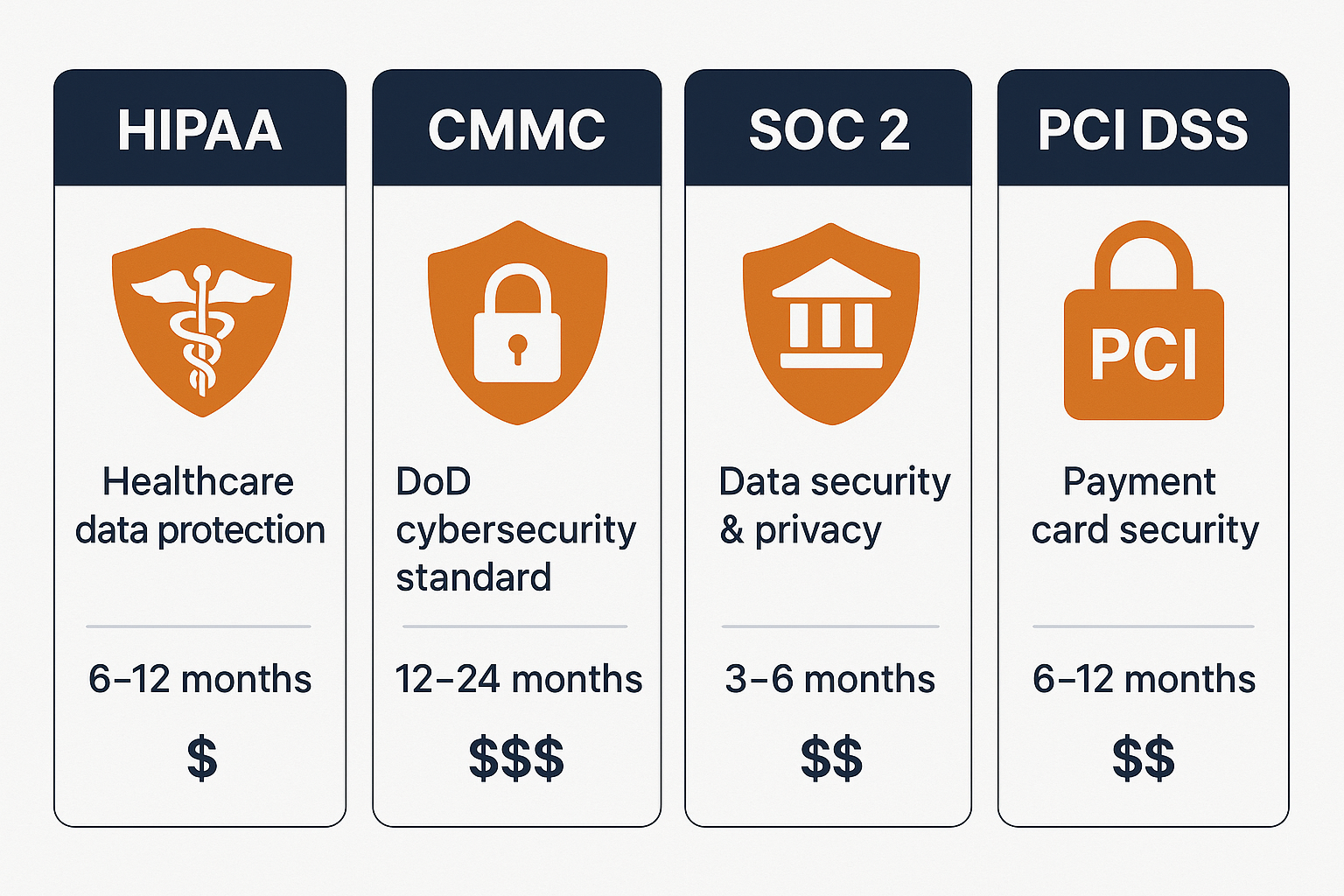
The biggest mistake I see Metro Atlanta business owners make is trying to tackle everything at once. Last year, I worked with a Gwinnett County manufacturing company that spent $50,000 on compliance software before understanding their actual requirements. They ended up starting over with a simpler, more focused approach.
Solution: The Metro Atlanta SMB Compliance Starter Kit
Step 1: Identify Your Compliance Requirements
Start by asking yourself these questions:
– What type of data does my business collect and store?
– Who are my current and target customers?
– What industries do I serve or want to serve?
– Are there any regulatory requirements specific to my business type?
Step 2: Conduct a Basic Risk Assessment
You don’t need expensive consultants for this initial assessment. Walk through your office and ask:
– Where is sensitive data stored (computers, servers, filing cabinets)?
– Who has access to this data?
– How is data transmitted (email, cloud services, physical transport)?
– What happens if this data is lost or stolen?
Step 3: Implement the Fundamentals
Before worrying about complex frameworks, nail these basics:
Strong Password Policies
– Require complex passwords (12+ characters)
– Implement multi-factor authentication
– Use password managers for your team
Employee Training
– Monthly security awareness sessions
– Phishing simulation exercises
– Clear data handling procedures
Device Management
– Inventory all devices with access to company data
– Implement remote wipe capabilities
– Require device encryption
Regular Backups
– Automated daily backups
– Test restoration procedures monthly
– Store backups in multiple locations
Real-World Example: Peachtree Pediatrics
Dr. Martinez runs a pediatric practice in Peachtree City with 15 employees. When she started her compliance journey, she felt overwhelmed by HIPAA requirements. Instead of hiring expensive consultants immediately, she:
- Started with employee training – Monthly 30-minute sessions on HIPAA basics
- Implemented basic access controls – Each employee only accesses the patient data they need
- Created simple documentation – Basic policies written in plain English
- Used affordable tools – HIPAA-compliant email and cloud storage solutions
Within six months, she was ready for her first HIPAA audit and passed with flying colors. Total investment: $3,000 versus the $25,000 quote she received from a large consulting firm.
Challenge #2: “It’s Too Expensive” – Cost-Effective Compliance for SMBs
I hear this concern constantly: “Compliance is only for big companies with big budgets.” That’s simply not true. Smart Metro Atlanta SMBs are finding creative ways to achieve compliance without breaking the bank.
Solution: The Lean Compliance Approach
Leverage Technology, Not Consultants (Initially)
Instead of hiring expensive compliance firms right away, start with these cost-effective tools:
Free and Low-Cost Compliance Tools:
– NIST Cybersecurity Framework – Free self-assessment tools
– HIPAA Risk Assessment Tool – Free from HHS.gov
– Google Workspace or Microsoft 365 – Built-in compliance features
– LastPass or Bitwarden – Affordable password management
Phase Your Investment
Don’t try to achieve full compliance overnight. Here’s a realistic timeline:
Months 1-3: Foundation ($1,000-$3,000)
– Employee training programs
– Basic security software
– Policy documentation
– Password management tools
Months 4-6: Enhancement ($3,000-$8,000)
– Professional risk assessment
– Advanced security tools
– Compliance software
– External audit preparation
Months 7-12: Certification ($5,000-$15,000)
– Professional audit/assessment
– Certification processes
– Advanced training
– Ongoing monitoring tools
Metro Atlanta Resource Spotlight: SCORE Mentors
Did you know that SCORE Atlanta offers free mentoring for small businesses, including guidance on compliance requirements? I’ve seen dozens of local business owners get valuable advice without spending a dime.
Other Local Resources:
– Georgia Small Business Development Center – Free compliance workshops
– Metro Atlanta Chamber of Commerce – Networking with compliance-savvy businesses
– Georgia Tech’s Enterprise Innovation Institute – Technology and compliance guidance
– Local CPA firms – Many offer compliance consulting at reasonable rates
Challenge #3: “My Team Doesn’t Understand” – Making Compliance Stick
Here’s a story that might sound familiar: Mike owns a successful HVAC company in Marietta. After a potential client asked about his cybersecurity practices, he implemented new policies and procedures. Three months later, he discovered employees were still using personal email for work and storing customer information on their personal phones.
The problem wasn’t the policies; it was the implementation and training.
Solution: Building a Compliance Culture
Make It Personal and Relevant
Instead of boring policy documents, help employees understand why compliance matters:
Connect to Their World
– “When you protect customer data, you’re protecting families like yours”
– “Following these procedures keeps our company strong and your job secure.”
– “Proper compliance helps us win bigger contracts and grow the business.”
Use Real Examples
– Share local news stories about data breaches
– Discuss how compliance wins have helped your business
– Show the connection between security and customer trust
Create Simple, Actionable Procedures
Transform complex compliance requirements into simple daily habits:
Instead of: “Implement administrative, physical, and technical safeguards to protect PHI”
Say: “Lock your computer when you step away, use the secure email system for patient information, and keep patient files in locked cabinets.”
Instead of: “Maintain least privilege access controls”
Say: “Only access the customer information you need for your specific job.”
The Monthly Compliance Check-I
Implement a 15-minute monthly team meeting focused on compliance:
Week 1: Review one policy or procedure
Week 2: Share a compliance success story or near-miss
Week 3: Practice a security scenario (like responding to a phishing email)
Week 4: Celebrate compliance wins and address questions
🎯 IT Compliance Framework Selector for Metro Atlanta SMBs
What type of business do you operate?
What type of data do you handle?
Who are your target customers?
What's your current compliance maturity?
🚀 Your Personalized Compliance Roadmap
Ready to Take IT Off Your Plate?
Stop worrying about downtime, security risks, or endless IT frustrations. AlphaCIS is the trusted IT partner for small and mid-sized businesses in Metro Atlanta, keeping systems secure, connected, and running the way they should every day.
Whether it’s preventing costly outages, protecting your data, or giving your team unlimited support, we make sure technology helps your business grow instead of holding it back.
📅 Book Your Free ConsultationReady to Turn Compliance Into Your Competitive Advantage?
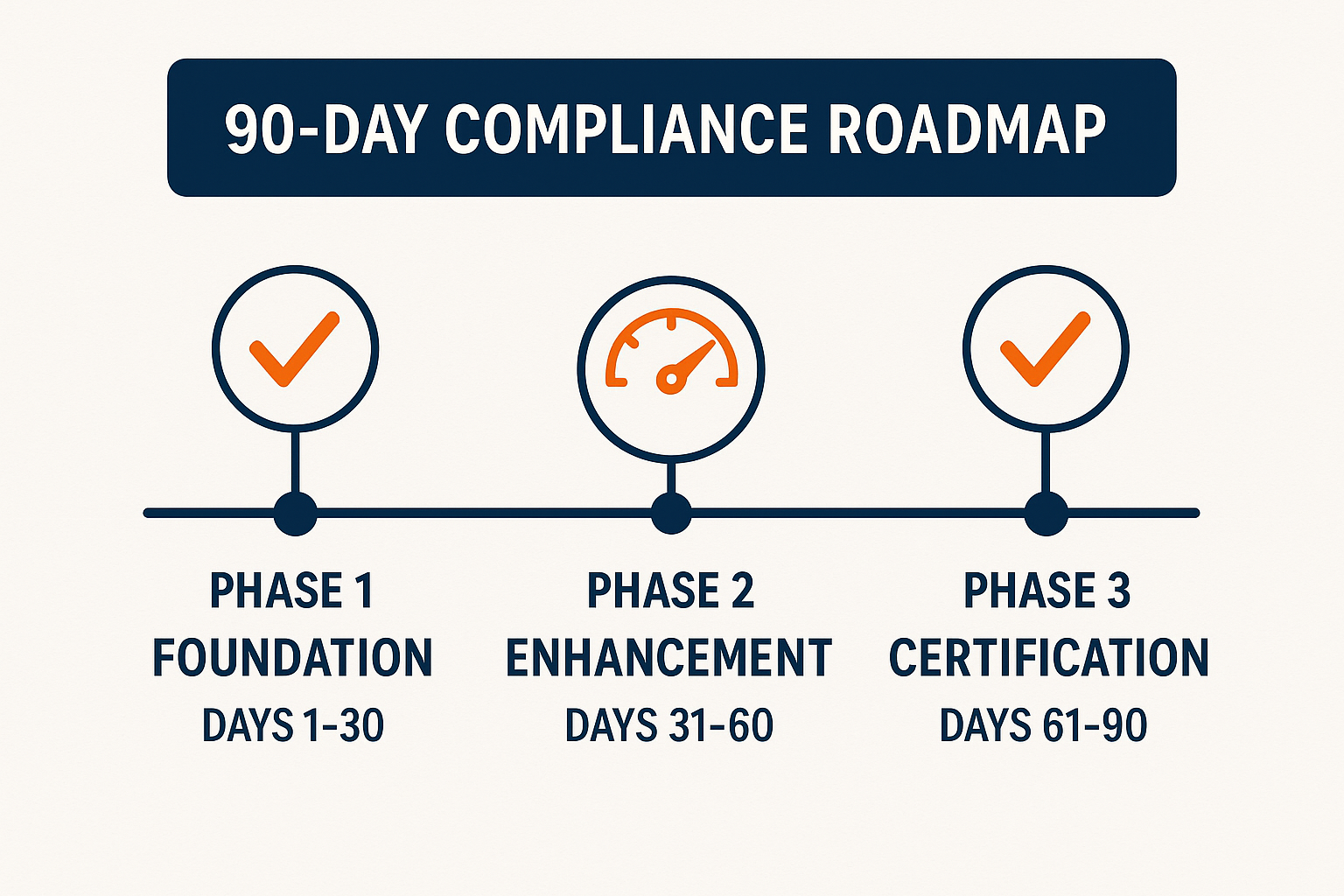
Challenge #4: “The Documentation Nightmare” – Simplifying Compliance Paperwork
Let me tell you about Jennifer, who runs a growing dental practice in Sandy Springs. When she started her HIPAA compliance journey, she downloaded a 200-page compliance manual from the internet. Six months later, it was still sitting on her desk, untouched, while her practice remained non-compliant.
The problem wasn’t that Jennifer didn’t care about compliance; it was that the documentation felt overwhelming and irrelevant to her day-to-day operations.
Solution: The Living Documentation Approach
Start Small and Build Gradually
Instead of trying to create comprehensive policies overnight, start with these essential documents:
The Essential Five Documents
- Employee Security Training Record – Who was trained, when, and on what topics
- Data Inventory Sheet – What data you collect, where it’s stored, who has access
- Incident Response Checklist – Step-by-step guide for security incidents
- Access Control Log – Who has access to what systems and data
- Vendor Security Assessment – Security requirements for third-party providers
Make It Relevant to Your Business
Transform generic compliance language into specific, actionable policies for your Metro Atlanta business:
Generic Policy: “Implement appropriate administrative safeguards”
Your Policy: “At [Your Business Name], we protect patient information by:
– Locking computers when stepping away from the desk
– Using secure email ([specific system]) for all patient communications
– Storing physical files in locked cabinets in the records room
– Conducting monthly team meetings to review security procedures”
The One-Page Policy Template
Here’s a simple template that works for most Metro Atlanta SMBs:
[Policy Name] – [Your Company Name]
Purpose: Why this policy exists (in one sentence)
Who: Who does this policy apply to
What: Specific actions required (bullet points)
When: Frequency or timing requirements
Consequences: What happens if policy isn’t followed
Questions: Who to contact for clarification
Last Updated: Date and next review date
Real-World Documentation Success Story
Tom owns a small IT consulting firm in Alpharetta. When he decided to pursue SOC 2 compliance, he was quoted $15,000 for policy development alone. Instead, he:
- Started with templates from AICPA and customized them
- Held weekly 30-minute team sessions to review and refine policies
- Used simple language that his 8-person team could understand
- Created checklists for common procedures
- Documented everything in a shared Google Drive folder
Total cost for documentation: $500 for templates and 40 hours of internal time. His SOC 2 audit went smoothly, and he now uses compliance as a selling point with enterprise clients.
Challenge #5: “Keeping Up with Changes” – Staying Current Without Going Crazy
Compliance requirements change constantly. New regulations, updated standards, evolving threats, it can feel like a full-time job just staying informed. For Metro Atlanta SMBs, this creates a real challenge: how do you stay current without taking time away from running your business?
Solution: The Compliance Monitoring System
Create Your Information Filter
Instead of trying to follow every compliance update, focus on sources that matter to your business:
Primary Sources (Check Monthly)
– Official websites for your required frameworks (HIPAA.gov, NIST, etc.)
– Industry associations relevant to your business
– Local Metro Atlanta business groups and chambers
– Your professional advisors (CPA, attorney, IT consultant)
Secondary Sources (Check Quarterly)
– Compliance blogs and newsletters
– Professional development webinars
– Industry conferences and events
– Peer business owner groups
The 15-Minute Monthly Compliance Check
Set a recurring calendar reminder for the first Friday of each month:
Minutes 1-5: Check primary sources for major updates
Minutes 6-10: Review any incidents or issues from the past month
Minutes 11-15: Update one policy or procedure based on what you learned
Leveraging Metro Atlanta Resources
Georgia SBDC Compliance Workshops
The Georgia Small Business Development Center regularly hosts compliance workshops specifically for local businesses. I’ve attended several, and they’re excellent for staying current on regional requirements.
Metro Atlanta IT User Groups
Groups like the Atlanta CIO Executive Network and Georgia Technology Association offer networking opportunities with other business owners facing similar compliance challenges.
Local Professional Services
Many Metro Atlanta CPA firms, law offices, and IT consultants offer compliance update services. Consider subscribing to newsletters or attending their educational events.
Challenge #6: “Remote Work Complications” – Compliance in a Hybrid World
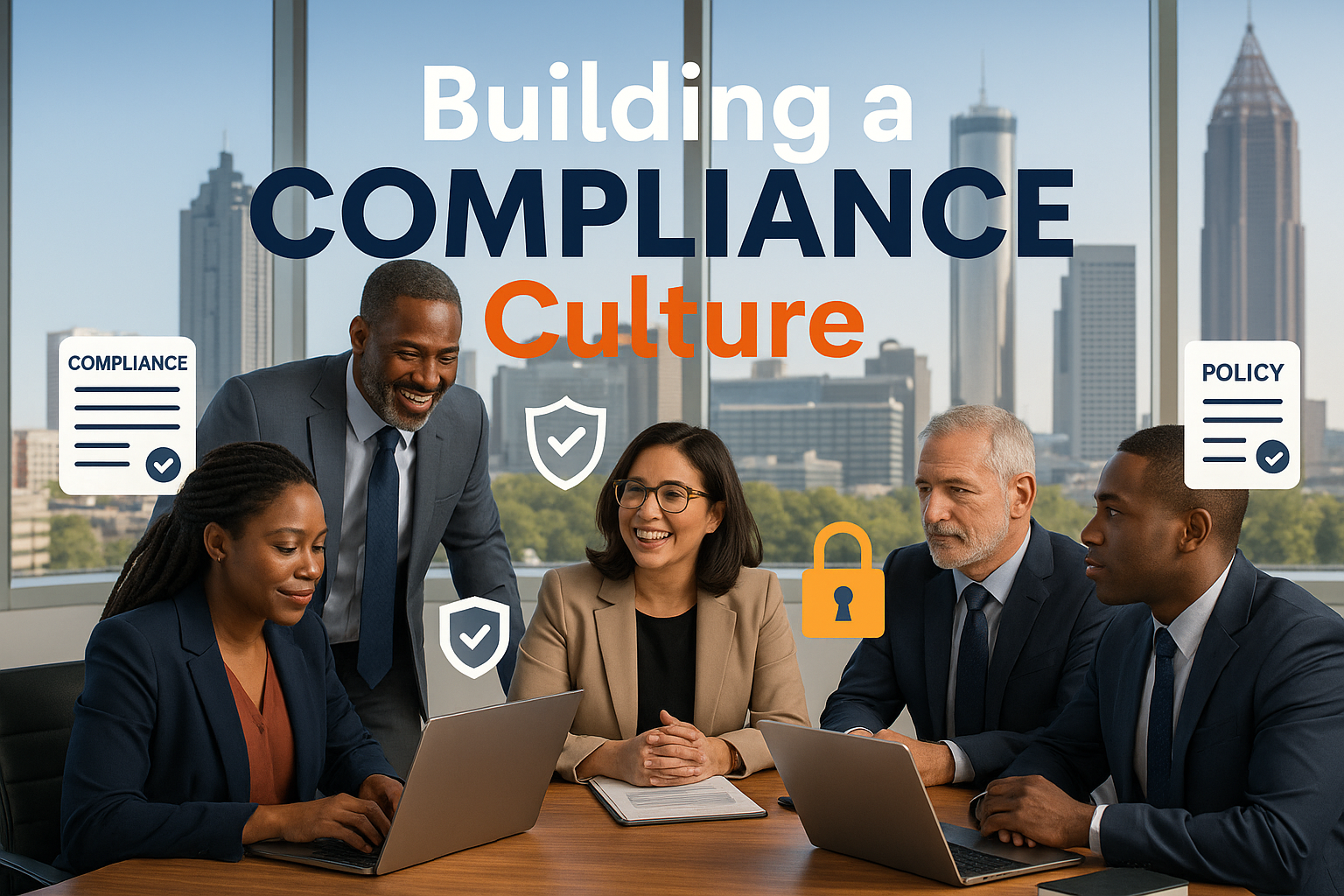
The shift to remote and hybrid work has complicated compliance for Metro Atlanta businesses. I recently worked with a Marietta-based accounting firm that discovered employees were accessing client tax returns from coffee shops in Buckhead and storing sensitive files on personal Dropbox accounts.
Remote work isn’t going away, so we need compliance strategies that work for distributed teams.
Solution: The Remote-First Compliance Framework
Secure Remote Access
VPN Requirements
– All employees must use the company-approved VPN when accessing business systems
– Provide clear instructions for VPN setup and use
– Monitor VPN usage and address compliance issues immediately
Device Management
– Company-owned devices with centralized management preferred
– If personal devices are used, implement mobile device management (MDM)
– Require device encryption and remote wipe capabilities
– Regular security updates and patch management
Cloud Security
– Use business-grade cloud services with compliance certifications
– Implement proper access controls and monitoring
– Ensure data is encrypted both in transit and at rest
– Regular backup and recovery testing
Home Office Security Standards
Create simple guidelines for employees working from home:
Physical Security
– Lock computers when stepping away
– Use privacy screens in shared spaces
– Secure physical documents in locked containers
– Ensure family members can’t access work devices
Network Security
– Use secure Wi-Fi networks (not public/guest networks)
– Change default router passwords
– Keep home networks updated and secure
– Report any suspected security incidents immediately
Metro Atlanta Remote Work Success Story
Lisa runs a healthcare billing service in Roswell with 12 remote employees across the Metro Atlanta area. When COVID-19 hit, she had to quickly implement HIPAA-compliant remote work procedures:
Her Solution:
- Invested in business-grade cloud infrastructure – Microsoft 365 with advanced security features
- Provided company laptops to all employees with centralized management
- Created simple home office security checklists that employees sign monthly
- Implemented weekly virtual security check-ins during team meetings
- Used secure communication tools for all business discussions
Results: Passed her HIPAA audit with flying colors and actually improved her security posture compared to the traditional office environment.
Making Compliance Work for Metro Atlanta’s Unique Business Environment
Metro Atlanta’s business environment is unique. We’re home to major corporations like Coca-Cola and Delta, growing tech companies in Alpharetta and Buckhead, thriving healthcare systems, and thousands of small businesses serving diverse markets.
This diversity creates both opportunities and challenges for SMB compliance:
Opportunities
Access to Enterprise Customers
Major Atlanta corporations increasingly require vendor compliance certifications. Achieving proper compliance can open doors to contracts with Fortune 500 companies headquartered here.
Healthcare Hub Advantages
With major healthcare systems like Emory, Piedmont, and Children’s Healthcare of Atlanta, there are significant opportunities for HIPAA-compliant businesses to serve this growing market.
Government Contract Potential
Georgia’s growing defense and aerospace industry, plus federal agencies in the region, create opportunities for CMMC-certified businesses.
Tech Ecosystem Growth
Atlanta’s emerging status as a tech hub means SOC 2 and other technology-focused compliance frameworks are increasingly valuable.
Challenges
Diverse Requirements
The variety of industries means different businesses need different compliance approaches. What works for a Gwinnett manufacturing company won’t work for a Buckhead financial services firm.
Resource Competition
Major corporations can outbid SMBs for top compliance talent, making it challenging to find affordable expertise.
Rapid Growth Pressure
Atlanta’s fast-growing business environment can pressure companies to prioritize growth over compliance, creating risks.
The Metro Atlanta SMB Advantage
Despite these challenges, Metro Atlanta SMBs have unique advantages:
Strong Business Community
Our region has active business networks, chambers of commerce, and professional associations that share compliance knowledge and resources.
Educational Resources
With institutions like Georgia Tech, Emory, and Georgia State University, we have access to cutting-edge research and expertise.
Professional Services Hub
Atlanta’s status as a business center means access to experienced compliance professionals, even if you can’t hire them full-time.
Innovation Culture
Our region’s entrepreneurial spirit means creative, cost-effective compliance solutions are constantly being developed.
Building Your Compliance Action Plan: A 90-Day Roadmap
Now that we’ve covered the major challenges and solutions, let’s create a practical 90-day action plan for your Metro Atlanta business.
Days 1-30: Foundation Phase
Week 1: Assessment and Planning
– [ ] Complete the compliance framework assessment (use our interactive tool above)
– [ ] Inventory all data your business collects and stores
– [ ] Identify your current security measures
– [ ] List all third-party vendors with access to your data
– [ ] Document your target customers and their compliance requirements
Week 2: Basic Security Implementation
– [ ] Implement strong password policies
– [ ] Set up multi-factor authentication on all critical systems
– [ ] Install and configure business-grade antivirus/anti-malware
– [ ] Ensure all devices have automatic security updates enabled
– [ ] Create a simple data backup procedure
Week 3: Employee Training Foundation
– [ ] Schedule initial security awareness training for all employees
– [ ] Create basic security procedures document
– [ ] Establish monthly security check-in meetings
– [ ] Implement incident reporting procedures
– [ ] Begin documenting training activities
Week 4: Documentation Start
– [ ] Create your first five essential policy documents
– [ ] Set up a centralized location for compliance documentation
– [ ] Begin maintaining access control logs
– [ ] Document your current security procedures
– [ ] Create a compliance calendar for ongoing activities
Days 31-60: Enhancement Phase
Week 5-6: Advanced Security Measures
– [ ] Implement network security improvements
– [ ] Set up endpoint detection and response tools
– [ ] Create secure remote access procedures
– [ ] Implement data encryption for sensitive information
– [ ] Establish vulnerability management procedures
Week 7-8: Vendor and Third-Party Management
– [ ] Assess security practices of key vendors
– [ ] Implement vendor security requirements
– [ ] Create business associate agreements (if HIPAA applies)
– [ ] Review and update contracts with security language
– [ ] Establish ongoing vendor monitoring procedures
Days 61-90: Certification Preparation Phase
Week 9-10: Internal Audit
– [ ] Conduct a comprehensive internal security assessment
– [ ] Test incident response procedures
– [ ] Review and update all documentation
– [ ] Address any gaps identified during assessment
– [ ] Prepare for external audit or assessment
Week 11-12: Professional Validation
– [ ] Engage external auditor or consultant for assessment
– [ ] Address any findings from professional review
– [ ] Complete certification applications if applicable
– [ ] Create ongoing monitoring and maintenance procedures
– [ ] Celebrate your compliance achievements!
Ongoing Maintenance (Month 4 and Beyond)
Monthly Activities
– Security awareness training for all employees
– Review and update one policy or procedure
– Monitor compliance news and updates
– Conduct basic security assessments
– Update vendor security assessments
Quarterly Activities
– Comprehensive internal security review
– Update risk assessments
– Review and test incident response procedures
– Evaluate new compliance requirements
– Plan compliance improvements for next quarter
Annual Activities
– External audit or assessment
– Comprehensive policy review and updates
– Employee security training refresh
– Strategic compliance planning
– Budget planning for compliance investments
Measuring Your Compliance ROI: Proving the Business Value
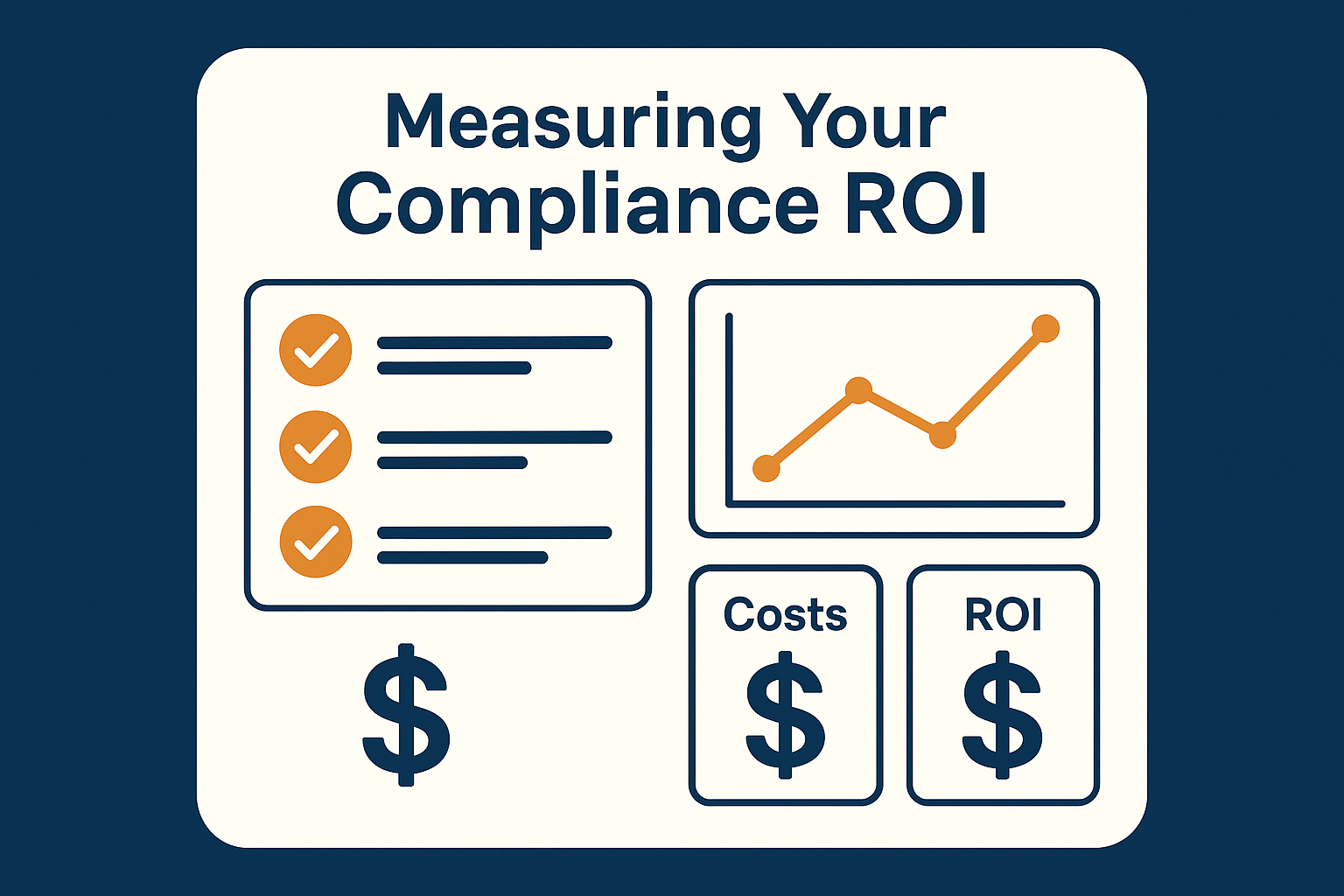
One of the biggest objections I hear from business owners in Metro Atlanta is: “How do I know if compliance is worth the investment?” The key is measuring both the direct and indirect returns on your compliance efforts.
Direct Financial Returns
New Revenue Opportunities
Track contracts and opportunities that require compliance certifications:
– Government contracts requiring CMMC
– Healthcare partnerships requiring HIPAA compliance
– Enterprise customers requiring SOC 2 reports
– Financial services clients needing security assessments
Cost Avoidance
Calculate potential savings from avoided incidents:
– Data breach costs (average $4.45 million in 2025)
– Regulatory fines and penalties
– Legal fees and litigation costs
– Business interruption losses
Indirect Business Benefits
Enhanced Reputation and Trust
– Customer confidence and loyalty
– Competitive differentiation
– Media coverage and recognition
– Industry leadership positioning
Operational Improvements
– Better security practices
– Improved employee awareness
– Streamlined procedures
– Reduced manual processes
Strategic Advantages
– Access to new markets
– Partnership opportunities
– Acquisition readiness
– Investor confidence
Metro Atlanta Success Metrics
Here are some real examples from local businesses:
Peachtree Medical Group (Name Changed)
– Investment: $12,000 in HIPAA compliance over 18 months
– Return: $180,000 in new contracts with local hospital systems
– ROI: 1,400% over two years
Alpharetta Tech Solutions (Name Changed)
– Investment: $25,000 in SOC 2 compliance over 12 months
– Return: $500,000 in enterprise contracts requiring SOC 2
– ROI: 1,900% in first year
Marietta Manufacturing (Name Changed)
– Investment: $35,000 in CMMC compliance over 18 months
– Return: $1.2 million government contract
– ROI: 3,300% over three years
Common Compliance Mistakes to Avoid
After working with hundreds of businesses in Metro Atlanta, I’ve seen the same mistakes repeated over and over. Here are the top pitfalls to avoid:
Mistake #1: The “Set It and Forget It” Approach
The Problem: Implementing compliance measures once and never updating them.
The Reality: Compliance is an ongoing process, not a one-time project.
The Solution: Create a compliance calendar with regular review and update activities.
Mistake #2: Focusing Only on Technology
The Problem: Thinking that buying security software equals compliance.
The Reality: Compliance is 70% people and processes, 30% technology.
The Solution: Invest equally in training, policies, and procedures as you do in technology.
Mistake #3: Copying Someone Else’s Approach
The Problem: Assuming what worked for another business will work for yours.
The Reality: Every business has unique compliance requirements based on its industry, customers, and data.
The Solution: Conduct your own assessment and create a customized approach.
Mistake #4: Waiting Until You Need It
The Problem: Starting compliance efforts only when a customer or contract requires it.
The Reality: Proper compliance takes months to implement effectively.
The Solution: Start your compliance journey before you need it, positioning yourself for opportunities.
Mistake #5: Trying to Do Everything Internally
The Problem: Believing you can handle all compliance requirements without external help.
The Reality: Compliance expertise is specialized and constantly evolving.
The Solution: Know when to invest in professional guidance and external audits.
The Future of Compliance for Metro Atlanta SMBs
As we look ahead to the rest of 2025 and beyond, several trends will shape the compliance landscape for Metro Atlanta businesses:
Emerging Compliance Requirements
AI and Data Privacy Regulations
As artificial intelligence becomes more prevalent in business operations, new regulations around AI governance and data privacy are emerging. Metro Atlanta’s growing tech sector will be particularly affected.
Supply Chain Security
With increasing focus on supply chain attacks, businesses will face more stringent requirements for vendor security assessments and supply chain risk management.
Environmental and Social Governance (ESG)
Larger customers and partners are increasingly requiring ESG compliance from their vendors, including cybersecurity and data privacy practices.
Technology Trends
Automated Compliance Monitoring
New tools are making it easier for SMBs to monitor compliance automatically, reducing the manual effort required for ongoing compliance management.
Cloud-First Compliance
As more businesses move to cloud-based operations, compliance frameworks are evolving to address cloud-specific security requirements.
Zero Trust Architecture
The shift toward zero-trust security models is influencing compliance requirements, particularly around access controls and network security.
Preparing for the Future
Stay Informed
– Subscribe to compliance newsletters and updates
– Attend industry conferences and webinars
– Join professional associations relevant to your industry
– Network with other Metro Atlanta business owners
Build Flexibility
– Design compliance programs that can adapt to new requirements
– Invest in scalable security technologies
– Create documentation processes that can accommodate changes
– Train employees on fundamental security principles that apply across frameworks
Partner Strategically
– Develop relationships with compliance professionals
– Consider managed security services for ongoing monitoring
– Join industry groups focused on compliance and security
– Participate in information-sharing initiatives
Local Resources and Support for Metro Atlanta SMBs
One of the advantages of operating in Metro Atlanta is access to excellent local resources for compliance support. Here’s a comprehensive list of organizations and resources that can help your compliance journey:
Government and Non-Profit Resources
Georgia Small Business Development Center (SBDC)
– Free consulting and workshops on compliance topics
– Locations throughout Metro Atlanta
– Industry-specific guidance available
SCORE Atlanta
– Free mentoring from experienced business professionals
– Many mentors have compliance and security expertise
– Regular workshops on business topics, including compliance
Metro Atlanta Chamber of Commerce
– Networking opportunities with compliance-focused businesses
– Educational seminars and workshops
– Advocacy for small business compliance concerns
Educational Institutions
Georgia Institute of Technology
– Cybersecurity research and education programs
– Executive education courses on security and compliance
– Student consulting projects for small businesses
Georgia State University
– Business consulting through the Small Business Development Center
– Executive education programs
– Research on cybersecurity and compliance topics
Emory University
– Healthcare compliance expertise through the medical school
– Executive education programs
– Research on healthcare security and privacy
Professional Organizations
Georgia Technology (Georgia Tech)
– Networking with technology professionals
– Educational events on cybersecurity and compliance
– Access to compliance-focused service providers
Atlanta CIO Executive Network
– Peer networking for IT leaders
– Best practice sharing on compliance topics
– Educational events and workshops
Georgia Society of CPAs
– Financial compliance expertise
– Educational programs on cybersecurity for financial professionals
– Networking with compliance-focused accountants
Industry-Specific Resources
Healthcare
– Georgia Hospital Association – compliance resources for healthcare organizations
– Medical Association of Georgia – practice management and compliance guidance
– Georgia Dental Association – HIPAA and security resources for dental practices
Manufacturing
– Georgia Manufacturing Alliance – CMMC and cybersecurity resources
– Manufacturing Extension Partnership – compliance consulting for manufacturers
– Defense contractors associations – specialized CMMC guidance
Financial Services
– Georgia Bankers Association – financial compliance resources
– Credit Union Association of Georgia – compliance guidance for credit unions
– Independent insurance agents associations – cybersecurity and compliance support
Conclusion: Your Compliance Journey Starts Today
We’ve covered a lot of ground in this guide, from understanding the basic compliance frameworks to creating a 90-day action plan for your Metro Atlanta business. But here’s the most important thing to remember: compliance is not a destination, it’s a journey that starts with a single step.
Whether you’re a healthcare practice in Roswell worried about HIPAA, a manufacturing company in Gwinnett pursuing CMMC certification, or a tech startup in Alpharetta working toward SOC 2 compliance, the principles remain the same:
Start with the fundamentals – Strong passwords, employee training, and basic security measures
Build gradually – Don’t try to achieve perfect compliance overnight
Focus on your specific needs – Not every business needs every compliance framework
Document everything – Good documentation is your best friend during audits
Make it a team effort – Compliance works best when everyone is involved
Leverage local resources – Metro Atlanta has excellent support for SMBs
Think long-term – Compliance is an investment in your business’s future
Your Next Steps
Don’t let compliance confusion continue to stall your growth. Here’s what you should do right now:
- Complete the compliance assessment using our interactive tool above
- Choose one fundamental security measure* to implement this week
- Schedule 30 minutes to begin documenting your current security practices
- Identify one local resource from our list to explore further
- Set a calendar reminder for monthly compliance check-ins
Remember Sarah from Roswell, who lost that $200,000 contract due to HIPAA compliance issues? Six months after implementing proper compliance procedures, she not only won that contract but landed two additional partnerships worth over $500,000 combined. Her investment in compliance paid for itself more than 20 times over.
The Metro Atlanta Advantage
As a Metro Atlanta business owner, you’re operating in one of the most dynamic and opportunity-rich business environments in the Southeast. Major corporations, growing healthcare systems, expanding government presence, and a thriving tech ecosystem create incredible opportunities for businesses that can demonstrate proper compliance.
Don’t let compliance confusion keep you on the sidelines while your competitors capture these opportunities. The businesses that invest in compliance today will be the ones winning the biggest contracts and partnerships tomorrow.
Your growth is waiting. Your customers are ready. Your compliance journey starts now.
Ready to transform compliance from a roadblock into your competitive advantage? Let’s build your compliance roadmap together.
Ready to Take IT Off Your Plate?
Stop worrying about downtime, security risks, or endless IT frustrations. AlphaCIS is the trusted IT partner for small and mid-sized businesses in Metro Atlanta, keeping systems secure, connected, and running the way they should every day.
Whether it’s preventing costly outages, protecting your data, or giving your team unlimited support, we make sure technology helps your business grow instead of holding it back.
📅 Book Your Free Consultation
Dmitriy Teplinskiy
I have worked in the IT industry for 15+ years. During this time I have consulted clients in accounting and finance, manufacturing, automotive and boating, retail and everything in between. My background is in Networking and Cybersecurity
